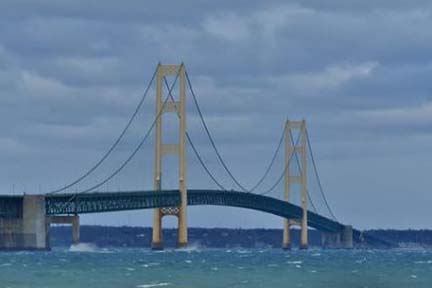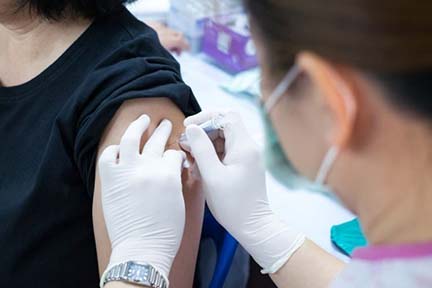
Whitmer Takes Action to Protect the Great Lakes

FOR IMMEDIATE RELEASE: November 30, 2021 Contact: [email protected]
Governor Whitmer Takes Action to Protect the Great Lakes To protect Michigan’s waters, administration believes state court should have final say in Line 5 case
LANSING, Mich. – Governor Whitmer today announced that the State of Michigan is shifting its legal strategy to give Michigan state courts the final say in protecting the Great Lakes by voluntarily dismissing the governor’s lawsuit against Enbridge in federal court. The governor’s goal remains protecting the Great Lakes, which means shutting down the Line 5 dual oil pipelines in the Straits of Mackinac as soon as possible. By clearing the way for the lawsuit filed by Attorney General Dana Nessel to go forward in Michigan state court, today’s action seeks to protect the Great Lakes and our state’s natural resources, which support 1.3 million jobs, including 350,000 jobs in Michigan, and generate $82 billion in wages annually.
“Today, I took further action to protect the Great Lakes from an oil spill and help us stay focused on getting the Line 5 dual oil pipelines out of the water as quickly as possible,” said Governor Gretchen Whitmer. “While I respectfully disagree, the federal court has now decided to keep the lawsuit I filed in November 2020. I believe the people of Michigan, and our state courts, should have the final say on whether this oil company should continue pumping 23 million gallons of crude oil through the Straits of Mackinac every day. After today’s action, Attorney General Dana Nessel’s lawsuit, filed in June 2019, should now be able to move forward expeditiously in state court. Our goal here remains the same: protecting the Great Lakes, protecting Michigan jobs, and protecting Michigan’s economy.
“Michigan state courts should have the right to determine what happens in our Great Lakes,” said Dan Eichinger, Director of the Department of Natural Resources. “No oil company sho
“The National Wildlife Federation strongly supports Governor Whitmer’s courageous and steadfast legal strategy to shut down Line 5 and protect Michigan’s interest in the Great Lakes from interference by a Canadian oil company,” said Mike Shriberg, Regional Executive Director of the National Wildlife Federation’s Great Lakes Regional Center. “Line 5 is an urgent threat to the Great Lakes and the Governor’s move to cut through Enbridge’s legal delay tactics is the best way to move forward toward what really matters: protecting the Great Lakes from a catastrophic oil spill.”
“The governor’s action today is an important step to protect our Great Lakes from the ticking time bomb of a catastrophic oil spill by allowing the state’s strong legal case to move forward and shut down the dangerous, aging Line 5 pipelines in the Straits of Mackinac,” said Lisa Wozniak, Executive Director of the Michigan League of Conservation Voters. “Governor Whitmer and Attorney General Nessel are again showing that they are dedicated to protecting our Great Lakes, the source of drinking water for millions and a critical driver of our economy.”
Background Line 5 is 68-year-old dual oil pipeline running along the bottom of the Straits of Mackinac with 23 million gallons of oil flowing through it every day. The governor and Department of Natural Resources Director Dan Eichinger issued a Notice of Revocation and Termination of Easement to Enbridge in November 2020 and filed in state court to enforce this action. Enbridge
In June 2019, before the governor filed her lawsuit, Attorney General Dana Nessel filed a separate lawsuit in state court to shut down the Line 5 dual pipelines that run through the Straits of Mackinac. The Attorney General’s lawsuit remains in state court, although the judge in that case has paused the lawsuit while the Governor’s lawsuit proceeded in federal court.
Today the governor filed a notice in federal court to voluntarily dismiss her lawsuit. The governor’s voluntary dismissal of her lawsuit should enable the Attorney General’s case to move forward in state court where this matter finally belongs and can move quickly to shut down the dual pipelines and protect the Great Lakes from a catastrophic oil spill. The Attorney General has taken the position that her lawsuit in state court should proceed. While the governor has taken action to reshape the state’s legal strategy, she is not withdrawing the Notice of Revocation and Termination of Easement, which she issued to Enbridge on November 13, 2020.
Today’s action does not impact Enbridge’s efforts to build a tunnel under the Straits of Mackinac.
Securing Michigan’s Energy Needs To ensure Michigan’s energy needs are met, Governor Whitmer has been laser-focused on diversifying the state’s energy needs to ensure access to cheaper clean energy sources. Under Governor Whitmer’s direction, the five-step MI Propane Security plan further ensures propane security for the residents of our state and businesses by:
Since early in 2019, the Whitmer Administration has been working with industry to preparing for and deploy alternatives to ensure energy security for both of Michigan’s peninsulas in the event of a Line 5 closure. |









